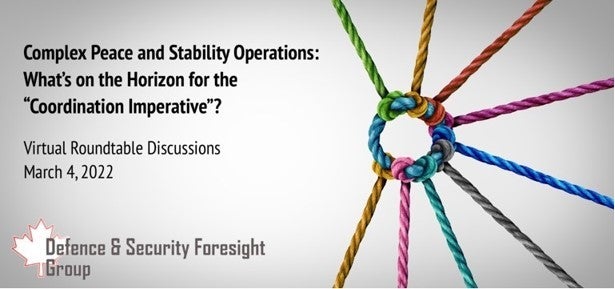
Efforts to advance global security, stability and peace in an increasingly complex and volatile world include a persistent narrative around the importance of coordination among government departments, teams and individuals to enhance their individual and collective impact. Driven in part by the complex and protracted nature of the contemporary security environment, frequently characterized by the co-existence of acute security and humanitarian issues and chronic under-development and fragility challenges, the pursuit of operational effectiveness for today’s security and humanitarian actors is a “wicked” problem.
While there is no shortage of opportunities for academic analysts, policy makers, practitioners to reflect on the need for greater coordination there are surprisingly few opportunities to meaningfully discuss the mechanisms by which this coordination might be achieved. Within various governments, organizational innovations (both formal and informal) abound in efforts to facilitate greater coordination and more effectual responses to complex policy and operational spaces such as those that dominate the peace and security landscape.
On March 4 2022 the Complex Peace Operations and Sub-Saharan Africa working group of the DSFG will be holding a one-day event to examine prominent themes in the research around ‘whole-of-government' or ‘integrated’ approaches and lessons learned from those involved with initiatives and organizational mechanisms designed to facilitate greater coordination amongst key actors.
This virtual event will comprise a series of roundtables where scholars and practitioners will engage in moderated discussions that explore key issues on the horizon for the “Coordination Imperative” and its role in the pursuit of peace and stability. We invite those interested in these topics to join the “audience” for one or more of the roundtables.
EVENT DETAILS
Date: Friday, March 4, 2022
Delivery: The event will take place on Zoom. A link to the event will be shared with registered participants.
Timing: Opening remarks will take place 9:45am AST / 8:45am EST.
The first roundtable discussion begins at 9:00am EST / 10:00am AST.
Registration: There is no cost to attend the event but registration in advance is required. (Please note this is a past event and registration is closed).
Questions? If you have any questions please do not hesitate to contact our Program Coodinator: Ben Ofosu-Atuahene (Benjamin.Ofosu-Atuahene@dal.ca)
Roundtable Sessions
Session #1
10 11:15 am AST
9 10:15am EST
The nuances of the coordination lexicon one size does not fit all
What do we mean when we use the word coordination in the context of complex peace and stability operations? How does the language we use connect to the way coordination unfolds in practice? To emphasize the myriad of coordination instruments available to practitioners, panelists will discuss the merits and challenges associated with various coordination instruments, including whole-of-government policy frameworks, dedicated coordination units at HQ and the practical experiences of and mechanisms for coordination in the field
Session #2
11:30 12:45pm AST
10:30 11:45am EST
When not to coordinate a frank conversation about the limits of coordination in certain contexts
Where to draw the line between coordination and staying in ones lane? The arguments for more coordination can be persuasive; however, coordination also has limits. Generally, it requires greater resources (money, people and time) and a consolidation of priorities that can be problematic for all involved. Moreover, efforts to coordinate can potentially compromise the core missions and capacities of key participants. What is the appropriate balance between coordination and autonomy in complex operational environments?
Session #3
1:45 3:00pm AST
12:45 2:00pm EST
Intersection of two imperatives Coordination and GBA+
Alongside the coordination imperative is the critical work of applying a gender-based analysis (GBA) to the development and implementation of peace and stability operations. Moreover, the GBA(+) imperative also includes responsiveness to the many other identity factors that define a person, including race, ethnic origin, religion, age, sexual orientation and intellectual or physical disabilities. In Canada, conducting GBA+ assessments as part of the process of developing of policies, programs and operations has become a core expectation of all federal departments and agencies. This roundtable will discuss the various intersections of the GBA+ imperative and the coordination imperative that is the focus of our event.
Session #4
3:15 4:30pm AST
2:15pm 3:30pm EST
Organizational learning developing an organizations capacity for coordination
The call for greater coordination often results in joint policy frameworks or dedicated coordination instruments in the form of taskforces, committees, or new departmental units. However, an organizations capacity for coordination is about more than a new taskforce. In this session we explore the role of training / education, bureaucratic processes, joint analysis, people management strategies and performance evaluation metrics in developing an organizations capacity for greater coordination.